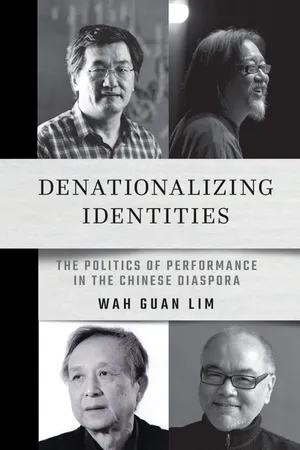
Denationalizing Identities
The Politics of Performance in the Chinese Diaspora
- 270 pages
- English
- ePUB (mobile friendly)
- Available on iOS & Android
About this book
Denationalizing Identities explores the relationship between performance and ideology in the global Sinosphere. Wah Guan Lim's study of four important diasporic director-playwrights—Gao Xingjian, Stan Lai Sheng-chuan, Danny Yung Ning Tsun, and Kuo Pao Kun—shows the impact of theater on ideas of "Chineseness" across China, Taiwan, Hong Kong, and Singapore.
At the height of the Cold War, the "Bamboo Curtain" divided the "two Chinas" across the Taiwan Strait. Meanwhile, Hong Kong prepared for its handover to the People's Republic of China and Singapore rethought Chinese education. As geopolitical tensions imposed ethno-nationalist identities across the region, these four dramatists wove together local, foreign, and Chinese elements in their art, challenging mainland China's narrative of an inevitable communist outcome. By performing cultural identities alternative to the ones sanctioned by their own states, they debunked notions of a unified Chineseness. Denationalizing Identities highlights the key role theater and performance played in circulating people and ideas across the Chinese-speaking world, well before cross-strait relations began to thaw.
Frequently asked questions
- Essential is ideal for learners and professionals who enjoy exploring a wide range of subjects. Access the Essential Library with 800,000+ trusted titles and best-sellers across business, personal growth, and the humanities. Includes unlimited reading time and Standard Read Aloud voice.
- Complete: Perfect for advanced learners and researchers needing full, unrestricted access. Unlock 1.4M+ books across hundreds of subjects, including academic and specialized titles. The Complete Plan also includes advanced features like Premium Read Aloud and Research Assistant.
Please note we cannot support devices running on iOS 13 and Android 7 or earlier. Learn more about using the app.
Information
Table of contents
- Acknowledgments
- List of Abbreviations
- Note on Transliteration
- Introduction
- 1. Articulating an Alternative Cultural Identity: Kuo Pao Kun’s Multilingual Theater Practice in Singapore
- 2. An Incomplete Break with the Past: The Remaking of Identity in Stan Lai’s Taiwanese Theater
- 3. Theater of Rebellion: Danny Yung and Experimental Hong Kong Theater
- 4. Diaspora within China: Gao Xingjian and the Theater of Exile
- Conclusion
- References
- Index